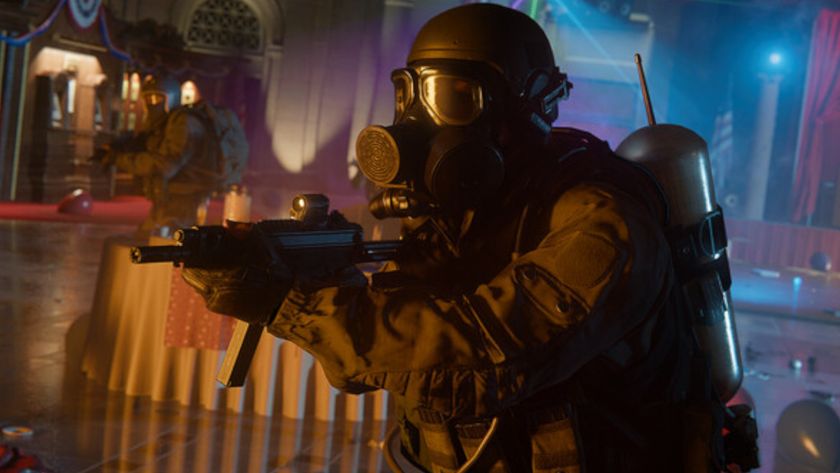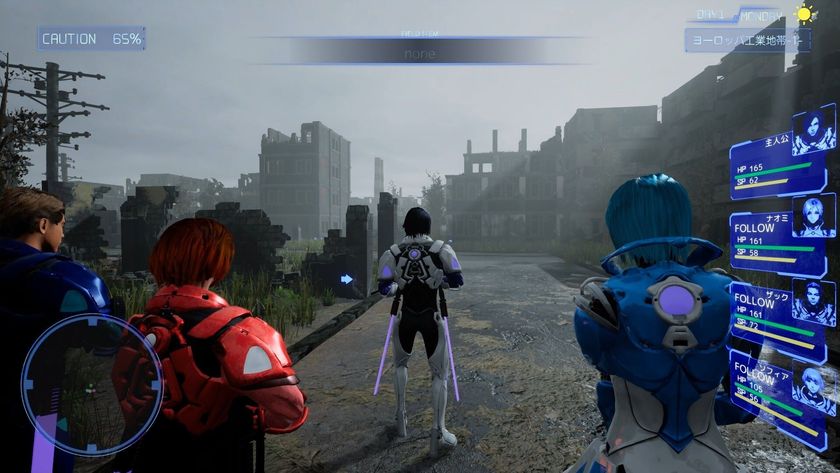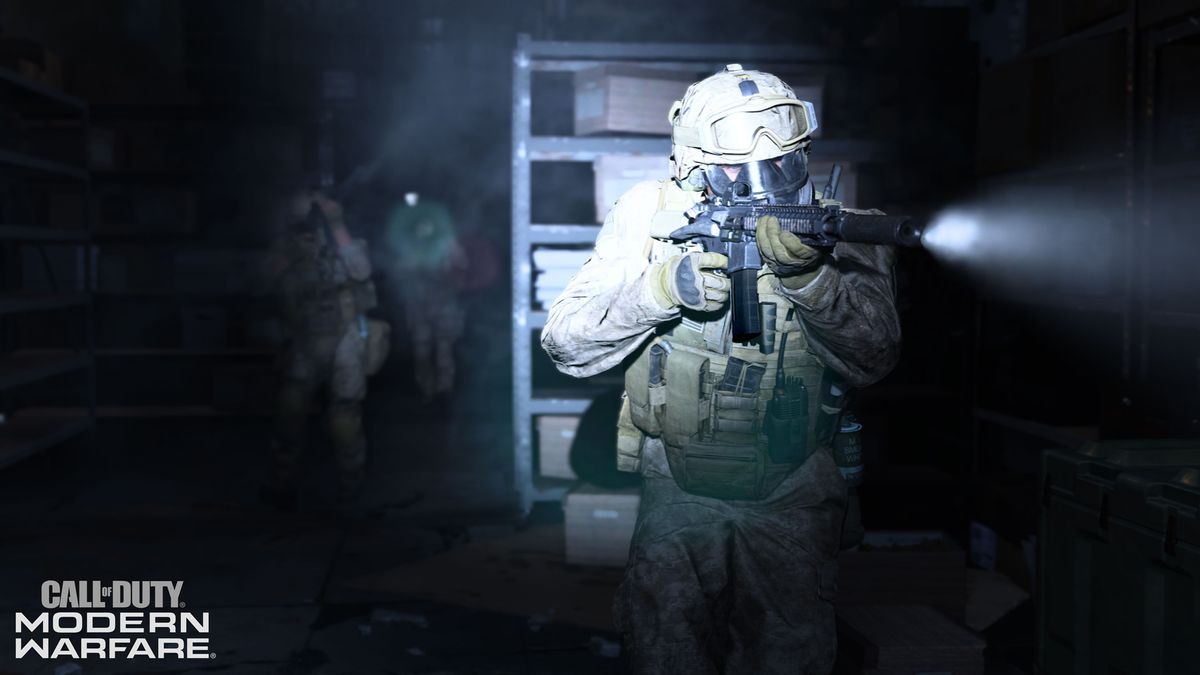
Before I sat down with the Call of Duty: Modern Warfare campaign, Infinity Ward's studio head and creative director told me that the studio "wanted to make a game that made you think." Patrick Kelly went on to explain that, "we hope you have fun, but we also hope at times you are a little uncomfortable when you play it. Ultimately, we tried to make a game that was topical; that reflects what soldiers today live with. We wanted to make a game that reflected the world we live in."
Kelly was keen to note that Infinity Ward "didn't try to be sensational" with the subject matter, and that the studio had to draw its own line throughout development in service of that. That was always going to be a challenge for Infinity Ward due to its insistence on splitting Modern Warfare's action between real and fictional locations; its insistence on drawing inspiration from real atrocities to create a tight campaign of spectacular action.

Just a heads up, we are weapons free with Call of Duty: Modern Warfare campaign spoilers from the go. If that's going to bother you, read no further.

Modern Warfare casts its opening statement under the shadow of a suicide bombing and a mass shooting in London's West End. Later, it depicts the assassination of minors, official diplomats, and the use of chemical weapons to tear apart an entire town, reflecting recent international incidents in Syria and Libya. Before it's all over, Infinity Ward even introduces the gamification of enhanced interrogation. It's certainly debatable whether the studio was successful in standing on the right side of a red line of its own design.
By the time the Modern Warfare credits rolled, I had found myself questioning whether Infinity Ward's decision to hold itself at arm's length from the real-world events that inspired it has ultimately done more harm than good. Infinity Ward's narrative director Taylor Kurosaki sat down with me to explore the creative decisions behind some of Modern Warfare's most divisive moments.
Inspiration and intention
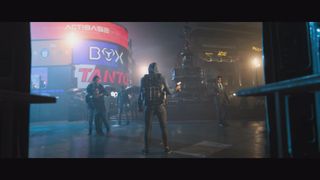
Much of Modern Warfare's execution could be accused of purposefully courting controversy. That's why it's important to first understand Infinity Ward's approach to the campaign and the influences behind its action before getting into the details of its design. "When we started out on this project, we made it very simple for ourselves. We looked at the name of the title – 'Modern Warfare' – and asked ourselves what that means in 2019."
"There hasn't been a Modern Warfare for eight years now. If the original trilogy captured the zeitgeist of that day, then we wanted to capture the zeitgeist of today. We wanted to dig into the ways that war has changed; the ways that it has gotten more complicated," Kurosaki tells me, explaining that Infinity Ward worked with military consultants, a share of whom were were enlisted into service following 9/11. Many shared the view, Kurosaki tells me, that "their jobs have gotten more and more complex" in the intervening 18 years, and that "their jobs have gotten harder" as a result. Infinity Ward wanted to reflect that in Modern Warfare's narrative, scripting, and staging.
Sign up to the 12DOVE Newsletter
Weekly digests, tales from the communities you love, and more
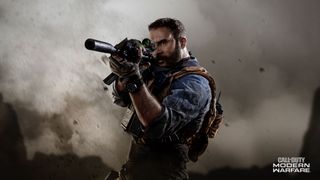
Game Modern Warfare
Developer Infinity Ward
Publisher Activision
Platforms PC, PS4, Xbox One
Release Out now!
"As an example, instead of it being a uniformed army that these soldiers are fighting, now it's against an enemy that doesn't wear a uniform. There isn't this clear delineation of 'this is where the battlefield is' because now it is in city centres; it is in your towns and your neighbourhoods," Kurosaki says, adding, "that was the jumping-off point for us to make a game that feels relevant today. Modern Warfare had to reflect how much more complex conflicts have become."
The studio also looked to the way that the wider entertainment industry has handled modern warfare since American boots first touched down on Afghan soil in October 2001. "The devs at Infinity Ward back in the day would say things like 'we're inspired by real life events, but we're also inspired by some of the best films in the war genre.' They would always talk about Black Hawk Down [...], and you can see its DNA in those original games. But in the same way that war has changed a lot between 2007 and 2019, there's been a whole slew of new literary works that have come out since the last Modern Warfare game," says Kurosaki, adding, "we are also inspired by films like Lone Survivor, American Sniper, and even Sicario."
Terror strikes at the heart of London
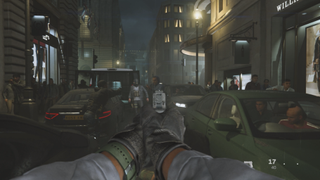
Modern Warfare struggles to strike a balance between authentically commenting on the realities of modern war and the need to create a blockbuster entertainment product – if such a hybrid of ideas and intentions could ever exist. Given the topics that the game is exploring, it's possible to interpret the campaign in a number of ways. To me, it became clear that Infinity Ward was eager to explore the true horror of contemporary conflict – using provocative imagery in a way that a predominantly Western audience would identify with immediately – whilst doing its best to keep its hands clean of the messy politics fueling the forever wars that have decimated the Middle-East.
You can see this reflected in Piccadilly, an early mission in Modern Warfare where a mass shooting is leveraged for little more than shock and awe. This mission casts you as a tourist to terrorism; it's a signal that, in 2019, conflict can collide with your life at any time, and that there's little you can do to defend yourself from it. It asks you to endure scenes of genuine horror, yet robbing you of the opportunity to reflect on the experience, switching the backdrop to the fictional Urzikstan before the debris has even had a chance to settle on its photo-realistic depiction of London's West End.
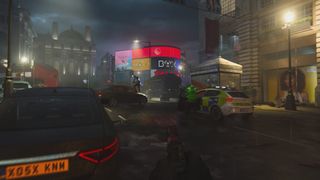
As one of the only missions bound to a real-world location, I asked Taylor why Infinity Ward felt it necessary to showcase scenes of graphic, gratuitous violence in a city that has felt the effects of terror attacks in the past, only for Call of Duty to shift its focus to a fictional location once it is time to go on the offensive. "Piccadilly is emblematic of the types of events that can occur, frankly, in any metropolitan city centre. This conflict is not about London, but that's where the conflict zone is. It's emblematic of, like, hey, it can happen anywhere and at anytime. But the central conflict is based in a fictional Middle Eastern country, and we spend most of the time there," Kurosaki tells me.
The answer doesn't get to the core of the question, but it does highlight the intention behind the mission's design. Piccadilly is ultimately a catalyst, used as a way to get you invested in an overseas war. Every player will respond to Piccadilly differently – such is the power of the interactive medium – so it ultimately falls to you to decide on whether helplessly manoeuvring through a traumatic assault in the streets of London is worth it for Modern Warfare "to have a relatable human scale," as Kurosaki would put it.
Escaping The Embassy
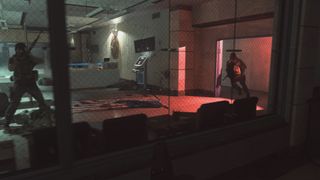
Modern Warfare's seventh mission – The Embassy – is undoubtedly one of its finest, the convergence of all of Modern Warfare's protagonists as they attempt to get a VIP out of an under-siege consulate building in the heart of Urzikstan. It is also potentially problematic, in that it seems to directly parallel one of the most infamous international incidents of the decade – the 2012 raid on the US Consulate in Benghazi, Libya.
"We're not trying to reproduce real world events. But we are inspired by the events that we see because those are the kinds of scenarios that are emblematic of this more complex war," Kurosaki tells me, as I ask whether Infinity Ward has drawn directly from the crisis to inspire this mission. "I don't think it's a leap to go, 'oh, that's very similar to...' but, you know, there have been other sieges of embassies before where people have been cut off."
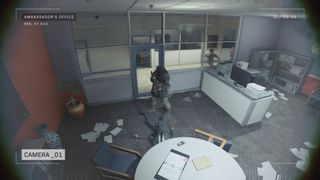
"This is fiction, but it should feel like it is plausible."
Taylor Kurosaki, narrative director
This is where the line between fact and fiction becomes blurry. A pivotal moment in The Embassy shows a US Ambassador – as well as other civilians, service members, and even minors – being assassinated as a group of militants and civilians sweep the structure in protest. While it's true that there have been other sieges of US Consulates – such as the 1979 assault on the US embassy in Tehran, immortalised in the movie Argo – just six American ambassadors have been killed in the line of duty since World War II.
By making such an incident explicit in The Embassy, it makes it easy for us to project the events that transpired in Benghazi onto the action as it unfolds. Because of this, I opine to Kurosaki that perhaps Infinity Ward should bear some responsibility in the way that it recognises and portrays incidents that hit a little too close to home.
Kurosaki believes that the fictional setting lets Infinity Ward explore the themes of contemporary conflicts without necessarily dealing with the real world ramifications so often born out of them. "That's why this is a fictional Middle Eastern country, because we're talking about themes. We're talking about situations that are like things that are in our common consciousness. It's not recreating the events of specific places because, frankly, if you try to do that [then] you are opening up a Pandora's Box of 'Well, did you oversimplify it? Did you dumb it down? Did you take liberties?'" Kurosaki explains, adding, "this is fiction, but it should feel like it is plausible."
Blurred lines between fact and fiction
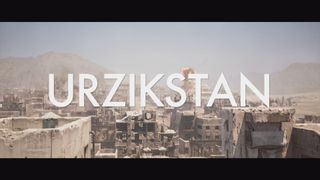
This is fiction, but is it only plausible because it is mirroring reality? Infinity Ward went to great lengths to walk that line. Kurosaki is eager to note that Infinity Ward has made it as difficult as possible for players to identify the Urzikstan, place it on a map, or draw any real comparisons with a real world locale – this fictional Middle-Eastern province shares a border with Russia, just to make it that little more complicated. Perhaps it's no surprise that much of Modern Warfare's action takes place in for that very reason. This way, he believes, the studio is free to explore universal themes of war without needing to make an explicit statement on real world events.
"The country is called Urzikstan; if you know about the region, countries that usually have that suffix the predominant language is usually Pashto, but in our fictional country people are speaking Arabic. It's another way of us saying 'don't try to [figure it out]' – this is a made up place. Again, we're drawing inspiration from lots of real world places; there are situations in the game that are reminiscent of Afghanistan in the 1980s, for example, but these are themes, they're not unique; they repeat themselves, they come up over and over again. So again, these are universal themes. And again, that's why [we chose] the fictional name."

Read the full GamesRadar Modern Warfare review for a look at how well Infinity Ward handled the broader strokes of the latest Call of Duty campaign.
I understand why Infinity Ward is framing it this way, but it's this approach that has ultimately muddied our ability to distinguish between historical events and their blurred replications in Modern Warfare. Kurosaki – and Infinity Ward – is steadfast in its declaration that the campaign is a fictional story that does not represent the real world today. As you weigh up your enjoyment of Modern Warfare in the aftermath of its campaign, only you can decide whether that statement holds any weight.
Piccadilly and The Embassy are traumatic missions by their very design. They are inspired by stories from the headlines, but Infinity Ward seems unwilling to engage any further than that. The burden falls to us then, as players, to consider whether that's appropriate in what is effectively bombastic military fiction. Whether it is Piccadilly or The Embassy, or missions like The Wolf's Den (which seems to mirror the 2011 raid of Osama Bin Laden's compound) and Highway of Death (which appears to rewrite American war crimes of the Gulf War), the question remains as to just how much responsibility the studio bears for representing real events. When the comparisons are so easily drawn, does a steadfast declaration that Modern Warfare is only playing within fictional borders really do enough? I fear that that's a question that will linger for far longer than the memory of Modern Warfare's campaign.
Part two of our sit down with Taylor Kurosaki will explore the missions Captive and Old Comrades, as well an exploration of Call of Duty's presentation of enhanced interrogation. You'll find that live on site this Friday.

Josh West is the Editor-in-Chief of 12DOVE. He has over 15 years experience in online and print journalism, and holds a BA (Hons) in Journalism and Feature Writing. Prior to starting his current position, Josh has served as GR+'s Features Editor and Deputy Editor of games™ magazine, and has freelanced for numerous publications including 3D Artist, Edge magazine, iCreate, Metal Hammer, Play, Retro Gamer, and SFX. Additionally, he has appeared on the BBC and ITV to provide expert comment, written for Scholastic books, edited a book for Hachette, and worked as the Assistant Producer of the Future Games Show. In his spare time, Josh likes to play bass guitar and video games. Years ago, he was in a few movies and TV shows that you've definitely seen but will never be able to spot him in.
Most Popular





